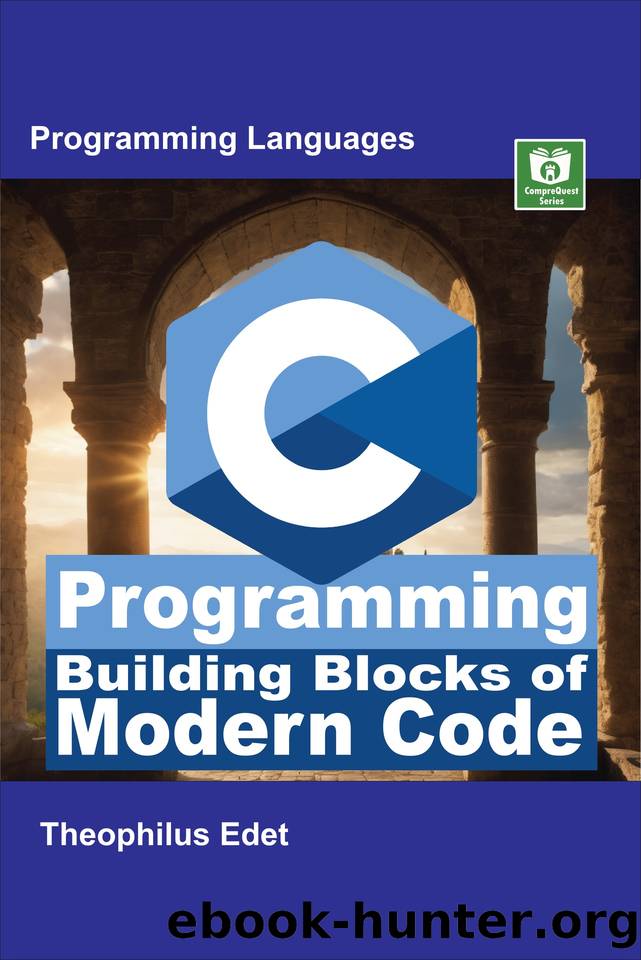C Programming: Building Blocks of Modern Code by Edet Theophilus

Author:Edet, Theophilus
Language: eng
Format: epub
Publisher: CompreQuest Books
Published: 2024-01-04T00:00:00+00:00
File Inclusion
The "Preprocessor Directives" module in the book "C Programming: Building Blocks of Modern Code" introduces developers to the essential concept of File Inclusion in C. File inclusion is a preprocessor directive that enables the incorporation of external files into a C program, promoting code modularization, reusability, and maintainability.
Including Header Files:
One primary use of file inclusion is to include header files containing declarations and macro definitions that are used across multiple source files. This practice facilitates the sharing of common elements like function prototypes and constants among various parts of a program.
// Example of including a header file
#include "common.h"
int main() {
int result = add(5, 3);
printf("Result: %d
", result);
return 0;
}
Here, the common.h header file contains the declaration of the add function, allowing its usage in the main.c source file without redefining the function prototype.
Conditional Inclusion with Header Guards:
To prevent multiple inclusions of the same header file, which could lead to compilation errors, header guards are employed. Header guards use preprocessor directives to ensure that a header file is only included once during the compilation process.
// Example of a header file with header guards
#ifndef COMMON_H
#define COMMON_H
int add(int a, int b);
#endif
In this example, the #ifndef, #define, and #endif directives collectively form a header guard in the common.h file, ensuring that the contents are only included once in a translation unit.
Including Source Files:
While including source files is generally discouraged, there are scenarios where it might be necessary, such as incorporating template code or implementing certain design patterns. Including source files directly into other source files can lead to code bloat and potential issues, so it should be done cautiously.
// Example of including a source file
#include "utility_functions.c"
int main() {
int value = 42;
int squared = square(value);
printf("Square of %d: %d
", value, squared);
return 0;
}
Here, the utility_functions.c source file is included directly. However, it's important to note that this practice should be approached with caution to avoid unintended consequences.
Standard Library Inclusion:
The C Standard Library provides a set of header files that define functions, constants, and macros. Inclusion of these files is fundamental for leveraging the standard functionalities offered by the C language.
// Example of including a standard library header
#include <stdio.h>
int main() {
printf("Hello, World!
");
return 0;
}
In this example, the <stdio.h> header is included to access the standard input/output functions like printf.
Usage of the #include Directive:
The #include directive is crucial for file inclusion in C. It instructs the preprocessor to insert the contents of the specified file into the source file during compilation.
// Example of the #include directive
#include "custom_header.h"
int main() {
greet();
return 0;
}
In this example, the #include "custom_header.h" directive includes the contents of the custom_header.h file, making the greet function accessible in the main function.
The "File Inclusion" section within the Preprocessor Directives module emphasizes the pivotal role of including external files in C programming. Whether incorporating header files for sharing declarations, employing header guards for preventing multiple inclusions, including source files cautiously, or leveraging standard library headers, the #include directive empowers developers to structure and organize their code effectively. Understanding and skillfully using file inclusion contribute to modular, maintainable, and reusable codebases in C.
Download
This site does not store any files on its server. We only index and link to content provided by other sites. Please contact the content providers to delete copyright contents if any and email us, we'll remove relevant links or contents immediately.
| Ajax | Assembly Language Programming |
| Borland Delphi | C & C++ |
| C# | CSS |
| Compiler Design | Compilers |
| DHTML | Debugging |
| Delphi | Fortran |
| Java | Lisp |
| Perl | Prolog |
| Python | RPG |
| Ruby | Swift |
| Visual Basic | XHTML |
| XML | XSL |
The Mikado Method by Ola Ellnestam Daniel Brolund(23568)
Hello! Python by Anthony Briggs(22703)
Secrets of the JavaScript Ninja by John Resig Bear Bibeault(21523)
Kotlin in Action by Dmitry Jemerov(20567)
Dependency Injection in .NET by Mark Seemann(20489)
The Well-Grounded Java Developer by Benjamin J. Evans Martijn Verburg(20383)
OCA Java SE 8 Programmer I Certification Guide by Mala Gupta(19536)
Algorithms of the Intelligent Web by Haralambos Marmanis;Dmitry Babenko(18333)
Grails in Action by Glen Smith Peter Ledbrook(17458)
Adobe Camera Raw For Digital Photographers Only by Rob Sheppard(16976)
Test-Driven iOS Development with Swift 4 by Dominik Hauser(11241)
Becoming a Dynamics 365 Finance and Supply Chain Solution Architect by Brent Dawson(8071)
Microservices with Go by Alexander Shuiskov(7841)
Practical Design Patterns for Java Developers by Miroslav Wengner(7739)
Test Automation Engineering Handbook by Manikandan Sambamurthy(7704)
Angular Projects - Third Edition by Aristeidis Bampakos(7182)
The Art of Crafting User Stories by The Art of Crafting User Stories(6642)
NetSuite for Consultants - Second Edition by Peter Ries(6561)
Demystifying Cryptography with OpenSSL 3.0 by Alexei Khlebnikov(6326)
